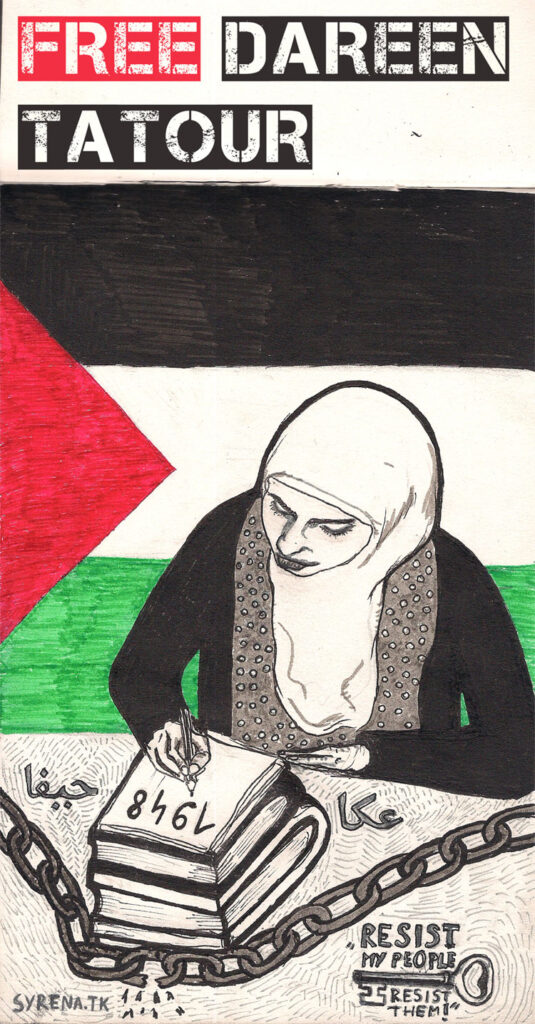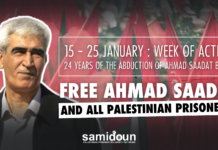
An Israeli court in Nazareth convicted Palestinian poet Dareen Tatour of “incitement” and “support for terror” for posting on Facebook and creating a poetry video on Thursday, 3 May. The conclusion of the trial – in an Israeli civil court – came after years of a lengthy trial and years of house arrest and confinement for the 36-year-old Palestinian poet. According to Yoav Haifawi, reporting from the court, “The judge wrote that if Tatour mentioned Palestinian innocent victims in her poetry ‘any reasonable person can only understand this as incitement to violent revenge.'”
She was first arrested in October 2015 after posting several Facebook statuses, including news information on the rising popular movement and intifada, a photo of Israa Abed and the words, “I am the next martyr,” and her poem, “Resist, my people, resist them.” (Abed is a Palestinian woman, also from ’48 Palestine, who was shot by Israeli police at a bus station; allegations against her were later dismissed.) She is one of hundreds of Palestinians – mostly from the West Bank and Jerusalem, but also from Palestine ’48 – arrested and imprisoned for posting their political positions and, in this case, their art, on Facebook and other social media.

Of couse, Dareen Tatour is far from the first Palestinian poet – including a number of poets from ’48 Palestine – targeted by the Israeli occupation for arrest and imprisonment. The jailing and trial of Dareen Tatour is an echo of the arrests and imprisonment of Mahmoud Darwish, Samih al-Qasim, Tawfiq Zayyad and many others, not to mention the assassination of Ghassan Kanafani, Wael Zuaiter, Kamal Nasser and other Palestinian poets and writers.
Indeed, at times, the trial has been somewhat surreal, as the meaning of words like “intifada” (uprising), “shahid” (martyr) and “qawem” (resistance) are debated in the courtroom between translators. Palestinian existence, expression and experience has become a subject for judicial debate about its inherent “violence.” The very act of a Palestinian writing poetry about her experience and the collective experience of her people is blatantly criminalized and labeled “terror” before the world.
After her arrest in October 2015, Tatour was jailed for three months before entering house arrest. Under the conditions of her house arrest, she has been barred from using the internet and communicating electronically. For months, she was restricted to an apartment in Tel Aviv and her brother and sister-in-law had to leave work to “guard” her before she was allowed to return to her home village of Reineh. She was monitored using an electronic ankle bracelet and was denied even visits to her family’s home for months.
Her case has drawn attention to the suppression of Palestinian literary and artistic voices. Hundreds of internationally renowned writers and artists, including Edwidge Danticat, Ahdaf Soueif, Alice Walker, Eve Ensler, Ariel Dorfman, Russell Banks and Barbara Hammer, have called for Tatour’s release and the dropping of charges against her, a call endorsed by PEN, the international freedom of expression association.
PEN Center USA joined with PEN International to issue a call to action and petition in support of Tatour and demanding the dropping of all charges against her. “After reviewing the charge sheet and the evidence against her, PEN has concluded that Dareen Tatour has been targeted for her poetry and activism and is calling for her immediate and unconditional release.” Jennifer Clement, president of PEN International, said that “Dareen Tatour is on trial because she wrote a poem. Dareen Tatour is critical of Israeli policies, but governments that declare themselves as democracies do not curb dissent. Words like those of Dareen Tatour have been used by other revolutionary poets, during the Vietnam war, during other liberation wars, and they can be found in the works of Sufiya Kamal of Bangladesh, of Ernesto Cardenal of Nicaragua, and so on.”
In an interview at Mondoweiss the day before the verdict, Tatour discussed her involvement with the marches of return inside Occupied Palestine ’48, especially now as the Marches of Return in Gaza are facing brutal repression and building worldwide support. She noted that she had been involved in creating documentary footage tracing Palestinian history and remembering the Nakba as well as organizing events at the marches. “As the annual March of Return events evolved to draw tens of thousands participants, they now also include tents with special exhibitions. In the last marches before her arrest Tatour maintained her own tent, with an exhibition of more than 500 photos from the destroyed villages and towns, under the title’ tell me about my village.’ This was not a one time event–but an annual exhibition during the March of Return that ran for several years.”

Samidoun Palestinian Prisoner Solidarity Network denounces the unjust conviction of Dareen Tatour for her poetry and literary expression. The arrest, trial and conviction of Dareen Tatour once again exposes the nature of the Israeli court system and its role as a fig leaf at best for a systematic attack on Palestinian rights and existence. Whether facing the military courts that convict 99.74 percent of the Palestinians that come before them, the administrative detention hearings that send Palestinians to prison without charge or trial or the “civil” courts that criminalize poetry and impose extreme sentences on the children of Jerusalem, the entire Israeli system is based on the dispossession and denial of Palestinians and is fundamentally unjust and racist at its core.
The case also highlights the criminalization of Palestinian political expression as a shared experience of all Palestinians, including Palestinians in the West Bank, Gaza Strip, Jerusalem and occupied Palestine ’48, as well as Palestinians in exile and diaspora that face surveillance, visa denials, deportation and imprisonment for their own political expression – all too frequently labeled as “terror,” as in Tatour’s case. The targeting of Palestinian resistance includes the targeting of Palestinian creative and literary expressions of resistance – and so must its defense.
Freedom and justice for Dareen Tatour and all imprisoned and persecuted Palestinians!
TAKE ACTION!
Dareen Tatour has been involved for almost two decades in documentation and mobilizing to remember the Nakba and demand the right of return of Palestinian refugees expelled from their homes and lands. Today, the Great Return March in Gaza and the mobilization of tens of thousands of Palestinian refugees – and the brutal murder of 45 and the wounding of thousands while participating in these marches to the colonial “border” once again highlights the core demand of the Palestinian struggle.
15 May marks the 70th anniversary of the Nakba as well as a major occasion in the ongoing Great Return March. Take action for Dareen Tatour by joining, participating and mobilizing for Nakba rallies and marches and support and solidarity events for the Great Return March.
You can take action at these events to highlight Dareen’s case specifically:
1. Read Dareen’s poem, “Resist, my people, Resist them.” A translation was created for ArabLit.com by poet Tariq al-Haydar, reproduced below. Stop the Israeli state from silencing and criminalizing Dareen’s poetry by reading it around the world over the microphone at Nakba rallies and Great Return March solidarity events.
2. Create a “return tent” like Dareen’s at your local Nakba event or memorial. Put up photos and images of destroyed Palestinian villages and accompany them with signs calling for the right of return for Palestinian refugees as well as a note honoring Dareen’s contribution to the struggle.
Dareen Tatour’s poem: “Resist, My People, Resist Them”
by Dareen Tatour (translated by Tariq al-Haydar)
Resist, my people, resist them.
In Jerusalem, I dressed my wounds and breathed my sorrows
And carried the soul in my palm
For an Arab Palestine.
I will not succumb to the “peaceful solution,”
Never lower my flags
Until I evict them from my land.
I cast them aside for a coming time.
Resist, my people, resist them.
Resist the settler’s robbery
And follow the caravan of martyrs.
Shred the disgraceful constitution
Which imposed degradation and humiliation
And deterred us from restoring justice.
They burned blameless children;
As for Hadil, they sniped her in public,
Killed her in broad daylight.
Resist, my people, resist them.
Resist the colonialist’s onslaught.
Pay no mind to his agents among us
Who chain us with the peaceful illusion.
Do not fear doubtful tongues;
The truth in your heart is stronger,
As long as you resist in a land
That has lived through raids and victory.
So Ali called from his grave:
Resist, my rebellious people.
Write me as prose on the agarwood;
My remains have you as a response.
Resist, my people, resist them.
Resist, my people, resist them.

Discover more from Samidoun: Palestinian Prisoner Solidarity Network
Subscribe to get the latest posts sent to your email.




